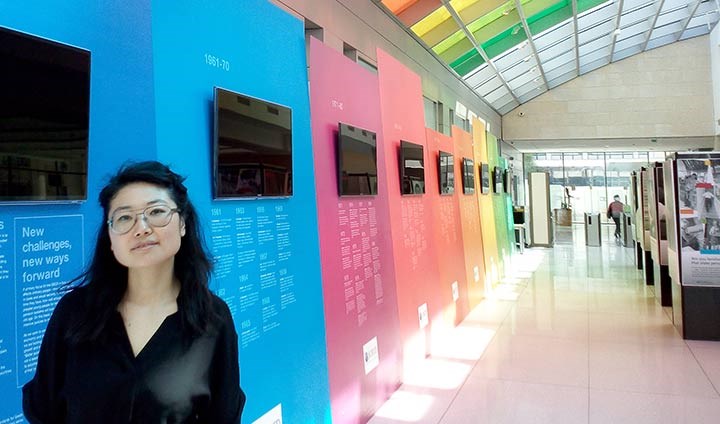How confidence in the WTO can be strengthened

Louise Johannesson at her new office, the OECD in Paris.
The US has recently voiced criticism against the way in which international trade disputes are settled within the World Trade Organisation, WTO. There are, however, ways to increase confidence in the method used for resolving trade disputes, as shown by Louise Johannesson in her doctoral thesis in economics from Örebro University.
"It is important to improve the way the system works, since the WTO is currently the only authority for resolving trade conflicts in a transparent and constructive manner. The alternative would be a reversion to private negotiations behind closed doors, where economic muscle would play a much bigger role," says Louise Johannesson who, following the defence of her thesis Settling disputes at the World Trade Organization, has taken up a position as analyst at the OECD in Paris, dealing with issues involving international service trade.
In several studies, she has examined how the mechanism for settling disputes within the WTO works and how it can be changed. A majority of the world’s nations are members of the WTO and the purpose of the agreement is to lower trade barriers. The model for settling disputes has been in place for 20 years and is used frequently.
"As with all agreements, conflicts arise if one member considers another to violate its commitment. To prevent such conflicts from escalating to downright trade wars, there is a formal legal system for resolving disputes," explains Louise Johannesson.
Disputed and time-consuming
When settling disputes within the WTO, a panel of judges is used and Louise Johannesson has looked into how these panellists are appointed.
"Often, they are selected through an agreement between the parties involved, sometimes a contentious and lengthy process."
"A lack of judges is a common cause of delay. Disputes have also become more complex, making it more difficult to find judges that are both available and have sufficient expertise," says Louise Johannesson.
"One consequence is that members opt for alternative paths to settling disputes, which favours economically strong countries," she says.
In her thesis, Louise Johannesson proposes a reform with permanently appointed judges. If panellists are used to working with each other, the process would be more time-efficient.
She has also studied the opportunities of developing countries to use the WTO system on equal terms as wealthier countries.
"It is a well-known fact that the poorest countries generally have never availed themselves of this mechanism for settling disputes, despite making up the majority of the membership. With the implication that the system may easily be viewed as a ‘rich man’s club’, which may well undermine the poorer countries’ confidence in the WTO."
Developing countries at a disadvantage
One way for the WTO to counterbalance this inequality has been to guarantee, in cases where a poorer member state is in a dispute with a wealthier member state, that at least one of the three judges come from a developing country.
"Data shows, however, that developing countries do not seem to be helped by having a judge from another developing country on the panel. On the contrary, which is surprising, this measure seems to decrease the probability of them winning the dispute," says Louise Johannesson.
This is somewhat contradictory, but one explanation may be that developing countries are pursuing disputes that are in fact less likely to be settled in their favour.
Text: Maria Elisson
Photo: Private
Translation: Charlotta Hambre-Knight
